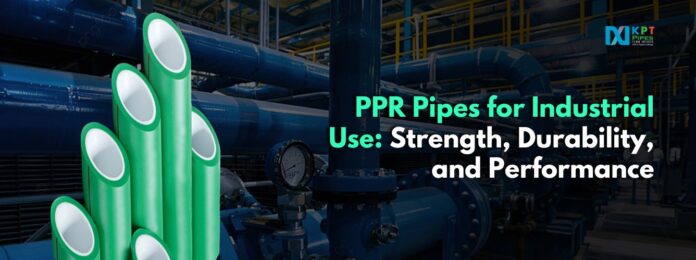Industrial operations demand robust, reliable, and efficient systems to ensure smooth workflows. One critical component in industrial infrastructure is the piping system, which must endure extreme conditions while maintaining operational efficiency. PPR Pipes (Polypropylene Random Copolymer pipes) have emerged as the top choice for industries worldwide due to their exceptional strength, durability, and performance. This blog will provide an in-depth analysis of the benefits of PPR pipes for industrial use, focusing on their strength, durability, and superior performance.
What Are PPR Pipes?
PPR Pipes are made from polypropylene random copolymer, a material that offers high resistance to heat, chemicals, and pressure. These pipes are widely used in various applications, such as water transportation, chemical processing, and heating systems. The structure of PPR pipes includes three layers that ensure excellent insulation, pressure resistance, and long-term performance.
Industries rely on PPR pipes because they are:
- Lightweight yet robust.
- Corrosion-resistant, ensuring longevity.
- Able to endure significant pressure and fluctuations in temperature.
Strength: Withstanding Industrial Challenges
Strength is a primary factor in selecting pipes for industrial use. PPR pipes are engineered to handle heavy-duty requirements.
1. High Pressure Resistance
Industries require pipes that can handle substantial pressure levels without deformation or leakage. PPR pipes excel in this regard, making them suitable for transporting liquids and gases under high pressure.
2. Thermal Stability
Industrial environments often expose pipes to high temperatures. PPR pipes can tolerate temperatures up to 95°C, ensuring their stability even in extreme conditions. This makes them ideal for applications like hot water systems and steam pipelines.
3. Impact Resistance
The tough structure of PPR pipes provides excellent resistance to physical impacts, reducing the risk of cracks or damage during transportation and installation. This feature enhances their reliability in demanding industrial settings.
Durability: A Long-Term Investment
Durability is a key consideration for industrial piping systems, as downtime caused by pipe failures can lead to significant financial losses.
1. Corrosion-Free
Unlike metal pipes, PPR pipes do not corrode when exposed to water, chemicals, or humid environments. This corrosion resistance ensures a longer lifespan and reduces maintenance costs.
2. Resistance to Chemical Reactions
In industries like chemical manufacturing, the piping system must withstand exposure to aggressive chemicals. PPR pipes are non-reactive to most chemicals, making them a preferred choice in such environments.
3. Leak-Proof Connections
The fusion welding technique used to join PPR pipes creates a seamless connection. This eliminates leakage issues, which are common in traditional metal pipes with threaded or flanged joints.
4. UV Resistance
Advanced PPR pipes are treated to resist UV radiation, making them suitable for outdoor industrial applications without degradation or loss of performance.
Performance: Efficiency Redefined
The performance of PPR pipes surpasses traditional piping systems due to their unique properties and design.
1. Energy Efficiency
PPR pipes have excellent thermal insulation properties, minimizing heat loss in hot water or steam systems. This results in energy savings, making them an environmentally friendly option.
2. Low Friction Loss
The inner surface of PPR pipes is smooth, reducing friction during fluid flow. This ensures efficient transportation of liquids and gases, enhancing the overall performance of industrial systems.
3. Noise Reduction
Industrial systems often generate noise due to fluid movement in pipes. PPR pipes minimize noise due to their insulation properties, ensuring a quieter work environment.
4. Eco-Friendly
As a recyclable material, PPR contributes to sustainable development goals. Industries increasingly prefer eco-friendly solutions to align with environmental regulations and corporate responsibility.
Applications of PPR Pipes in Industries
1. Water Supply Systems
PPR pipes are extensively used for both hot and cold water supply systems in industries. Their durability and thermal resistance make them ideal for sectors like beverage production and chemical processing, where consistent water flow is crucial. Additionally, they exhibit resistance to scaling and corrosion, thereby guaranteeing sustained reliability over time.
2. Chemical Transport
Industries rely on PPR pipes for transporting corrosive substances such as acids, alkalis, and other chemicals. Their chemical resistance ensures safety and prevents pipe degradation, even under harsh conditions. This makes them a preferred choice in petrochemical plants and laboratories.
3. HVAC Systems
Heating, ventilation, and air conditioning systems benefit from the thermal efficiency of PPR pipes. Their excellent insulation properties reduce energy loss, enhancing overall system efficiency. PPR pipes also withstand high temperatures, ensuring long-lasting performance in demanding environments.
4. Compressed Air Systems
PPR pipes are highly resistant to pressure, making them ideal for compressed air systems in industrial settings. They can handle high-pressure requirements without deformation or leaks, ensuring a stable supply of compressed air for machinery. Their lightweight nature also simplifies installation.
5. Food and Beverage Industry
The non-toxic and hygienic properties of PPR pipes make them suitable for food-grade applications. They comply with stringent health standards, ensuring safe transport of liquids in the food and beverage industry. Additionally, their smooth inner surface prevents contamination and bacterial growth.
Why Choose KPT Pipes?
1. Advanced Manufacturing Processes
KPT Pipes leverages state-of-the-art technology and adheres to rigorous quality control measures during production. This ensures that their PPR pipes are durable, efficient, and capable of meeting the high demands of industrial applications.
2. Wide Range of Products
KPT Pipes offers a diverse product portfolio, from standard PPR pipes to specialized variants like UV-resistant and glass fibre-reinforced pipes. These options cater to different industrial needs, providing versatile solutions for various applications.
3. Sustainability Focus
As a responsible pipes manufacturing company in India, KPT Pipes emphasizes eco-friendly production practices. Their PPR pipes comply with global environmental standards, aligning with the sustainability goals of modern industries.
4. Exceptional Support
KPT Pipes provides comprehensive support, including technical guidance and on-site assistance for installation and maintenance. Their focus on customer satisfaction ensures seamless integration of their PPR pipes into industrial systems.
Comparing PPR Pipes with Other Materials
Feature
PPR Pipes
Metal Pipes
PVC Pipes
Corrosion Resistance
Excellent
Poor
Moderate
Thermal Stability
Up to 95°C
Moderate
Poor
Chemical Resistance
Excellent
Limited
Good
Durability
High
Moderate
Low
Maintenance
Low
High
Moderate
Environmental Impact
Recyclable
Non-recyclable
Recyclable
Conclusion
The industrial sector requires piping systems that can endure extreme conditions without compromising performance. PPR pipes have proven to be the ultimate solution, offering unmatched strength, durability, and efficiency. As a trusted pipes manufacturing company in India, KPT Pipes continues to lead the way in providing innovative piping solutions for industries. Their commitment to quality and sustainability ensures that industries can rely on their products for long-term success.
Investing in PPR pipes from KPT Pipes is not just a choice for superior industrial performance—it’s a step toward a sustainable and efficient future.
FAQs
1. What makes PPR pipes suitable for industrial use?
PPR pipes are durable, corrosion-resistant, and capable of withstanding high pressure and temperature variations, making them ideal for demanding industrial environments.
2. Are PPR pipes eco-friendly?
Yes, PPR pipes are recyclable and contribute to reducing environmental impact, aligning with sustainability goals.
3. How do PPR pipes compare to metal pipes?
Unlike metal pipes, PPR pipes are corrosion-resistant, lightweight, and require minimal maintenance, offering better long-term performance.
4. Can PPR pipes handle chemical transport?
Yes, PPR pipes are resistant to most chemicals, making them suitable for transporting acids, alkalis, and other corrosive substances.
5. Why choose KPT Pipes for industrial piping needs?
KPT Pipes is a leading pipes manufacturing company in India, offering high-quality, durable, and eco-friendly PPR pipes tailored for industrial applications.

